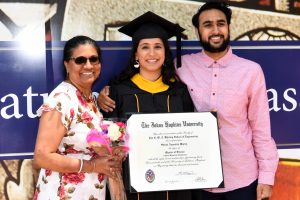Graduate School Application Help
Whether you’re looking for the requirements to apply for a master’s degree or to learn more about how our online courses work, we’ve compiled some of our more commonly asked questions and answered them below.
If you have additional questions after looking through these and need more help applying to graduate school, contact us at 1-800-548-3647 Monday through Friday, 8:30 to 5:00 p.m. EDT or email us at ep-admissions@jhu.edu.
FAQs for Prospective Students
Applicants must have no more than 30 credits remaining in their undergraduate degree or already hold an undergraduate degree, have earned a grade point average of at least 3.0 on a 4.0 scale, among other requirements per program. You can learn more about the requirements to apply for a master’s degree here.
All official transcripts must be received by Engineering for Professionals directly from the granting institution or third party provider. All other application materials should be submitted through the official application portal. Please see our page for more information.
Johns Hopkins Engineering for Professionals is part of The Johns Hopkins University, which is accredited by the Middle States Commission on Higher Education, 3624 Market Street, Philadelphia, PA 19104. (267-284-5000) The Middle States Commission on Higher Education is an institutional accrediting agency recognized by the U.S. Secretary of Education and the Council for Higher Education Accreditation. The Master of Science in Engineering in Systems Engineering program is accredited by the Engineering Accreditation Commission of ABET.
Applications are accepted on a continuing basis but we recommend applying no less than one month before the start of a semester. View the academic calendarAcademic Calendar.
There is no offer response deadline for admissions. Acceptance will be honored up to a year after admission. Please check the academic calendar for term start dates. For more details about admissions policies, view the academic catalog.
Remember: Accepting your offer helps you continue with the enrollment process and initiates an email that will provide you with your advisor’s contact information along with information about registration. Tuition is only due at the time of registration.
Please see the Tuition & Fees page for more details.
All graduate level courses (600-level and above) earn three credit hours.
All coursework in your selected program must be completed within a specified period that begins with the start of the first course you take in your program.
- Master’s Degree—5 years
- Post-Master’s Certificate—3 years
- Graduate Certificate—3 years
For a master’s degree or certificate, requests will be considered on an individual basis. To initiate a request to transfer credit(s), contact your admissions coordinator. For reference, please have the course name, number, description, and syllabus (for comparison/interpretation) available to discuss and review. Courses must be graduate-level and directly applicable to the student’s program of study at Johns Hopkins Engineering for Professionals. More information about transfer can be found on the Academic Regulations page. The fee for transferred courses can be found on the Tuition & Fees page.
We offer part-time master’s degrees and certificates in a variety of engineering and science disciplines.
Students may register as auditors in any EP course. Although regular attendance is expected of auditors, they are exempt from quizzes, examinations, and other assigned work, and they receive no credit for the course.
Please contact our office at 410-516-2300. Please refer to the Academic Calendar to know when courses start. We must have your transcript at least 2 weeks before the start of classes.
Yes, you may register as a special student or in a certificate program. However, you must still meet the admission requirements.
All students are assigned advisors.
Yes. We offer post-master’s certificates and graduate certificates in many of our programs.
Johns Hopkins University does offer a Doctor of Engineering program that is designed for professional engineers. It is a full-time program that is pursued non-residentially. The program takes the form of a research collaboration between a student’s employer and the Whiting School of Engineering. For more information, please visit the DEng website.
Federal financial aid is available. Please see our financial aid page for more information.
Ten courses are required for a master’s degree. Four or five courses are required for a post-master’s certificate. Four or five courses are required for a graduate certificate.
No, a thesis or a comprehensive exam is not required. Some programs, however offer a thesis as an option:
-
Applied and Computational Mathematics
-
Electrical and Computer Engineering
-
Mechanical Engineering
-
Systems Engineering
Yes, you can pursue an online master’s degree through Engineering for Professionals as a full-time student. However, if you work full-time, we do not recommend taking a full course load (more than two courses per term). Remember, you have up to five years to complete the master’s degree program.
Our onsite courses are typically offered during the evenings, Monday through Friday, and Saturday mornings and afternoons. Our online and virtual live options offer even more flexibility.
Please refer to the academic calendar for the most recent information.
Please contact our office at 410-516-2300.
Yes. You can return and take additional courses as a special student/non-degree-seeking student, or you can work toward a second master’s degree or certificate. Please review the academic regulations to learn more about these options.
Johns Hopkins Engineering for Professionals is committed to providing reasonable and appropriate accommodations for students with disabilities. Please visit the disability services page for more information.
If your official transcripts are not received, your registration for the upcoming term will not be processed. Our courses fill up quickly so we would like for you to avoid having this disruption. Please see our admission requirements page for more information.
How does the EP degree appear on the diploma?
The Johns Hopkins Engineering for Professionals diploma is the same as the full-time Whiting School of Engineering diploma. Online and Engineering for Professionals are not designated.
Get graduate school application help and learn more about the requirements to apply for master’s degree and certificate programs through one-hour online information sessions.
You can ask questions and interact with the program chair, talk with students or alumni about their experiences, and learn about how to get help applying to graduate school.
Provisional Admission
Interested in advancing your career but do not meet prerequisites of the certificate or master's degree part-time admission requirements? You can still be admitted under provisional student status. Take prerequisite courses and transition into your official program of study upon their completion.
FAQs About Provisional Admission Status
Provisional admission means that you will be accepted into the Engineering for Professionals program but must complete certain undergraduate coursework before your status is fully confirmed.
You will receive an official notice through the EP admissions application account you created from the Johns Hopkins University Admissions Office. The notice will explain your provisional status and the conditions that need to be met before you can be fully admitted.
The timeframe to meet the conditions of provisional status is typically accomplished within three semesters (one year) of receiving your provisional status, but is not a required timeframe.
If you are admitted under a provisional status you are required to complete your provisional requirements before starting any graduate courses.
If the conditions for full admission are not met within the specified timeframe, your provisional status may be revoked, and you may not be allowed to continue in the program. You may receive guidance from the admissions office on how to resolve the issue or reapply.
If you believe that there are extenuating circumstances or if you have not received clear instructions regarding the conditions of provisional status, you may contact the Admissions Office to discuss your situation. An appeal process may be available on a case-by-case basis.
No. You will need to complete your provisional requirement first, and then once you begin your graduate program is when you will have access to Stellic.
You can check your provisional admission status by logging into your application portal or by contacting the Admissions Office directly.
For questions about provisional admission status, contact the Engineering for Professionals Admissions Office at ep-admissions@jhu.edu for assistance.
18+ years: We know online education.
Find a whole new realm of possibility as you study with pioneers in engineering—online and on your schedule.

Online Learning at Johns Hopkins Engineering - Create a better future. Start here.

Engineers See the World Differently -
FAQs About Online Courses
Online courses at Johns Hopkins Engineering for Professionals provide many opportunities for student-instructor interaction. Instructors are required to post their contact information in the course syllabus and to state how quickly students can expect to hear back from them. Instructors also use various communication and facilitation tools within the course management tool (i.e., Canvas).
Types of interaction typically include course announcements, instructor discussion forum postings, assignment feedback, and weekly, synchronous office hours. Instructors are encouraged to log in to their course site daily or at least five times a week.
Students taking online courses at Johns Hopkins Engineering for Professionals have access to a wide range of support services comparable to students taking onsite courses. Some of those services include live office hours, academic advising, the online bookstore, career placement assistance, student email, financial aid assistance, a digital library of resources with live library support, mentoring, and technical support. And through the Johns Hopkins Student Assistance Program students have access to tremendous support for life challenges and emotional well-being.
An online course is typically composed of either twelve (summer term) or fourteen (fall/spring terms) course learning modules. Each module is equivalent to one week of instruction. Different programs and instructors can chose to modify this structure. A module is composed of various learning objects such as a module learning guide, recorded video lectures, module readings, discussion forum questions, module assignments, and either module or course assessments.
Every course includes a course syllabus and a course outline. The course syllabus includes a detailed explanation of what the course is about, what students can expect to learn, how their learning will be assessed, and policies they are expected to follow. The course outline provides the student with the course-at-a-glance, which lists all the course topics by date, what is required, and when.
Online students will utilize web-based technologies within their online courses: Canvas and Zoom. Microsoft Teams is also used in some courses. Canvas is a web-based learning management system used to deliver all online courses at Johns Hopkins Engineering for Professionals. Students access their courses by logging in to Canvas with their JHU student identifier and password. Zoom, a web-based conferencing tool, is used to facilitate weekly, live office hours. Some courses may require other specialized software applications, such as virtual desktop applications or remote labs, but all are designed to be accessible via the web.
Students new to online instruction are strongly encouraged to complete an orientation course. This course provides an overview of the technologies used in online courses and provides helpful suggestions on how to be an effective online student.
Any current student with an internet-enabled device can take an online course. Online courses at Johns Hopkins Engineering for Professionals are accessible via most mobile devices.
No, not for classes. However, many online courses do conduct optional, weekly live office hours. These office hours are usually scheduled on a specific day and time each week. But even if you miss the live office hours, you can listen to recorded sessions.
Online courses are open to all admitted students at Johns Hopkins Engineering for Professionals and we encourage international students to consider online courses.
You can switch between online and onsite courses, depending on your program’s offerings, in any given academic term or take a combination of online and onsite courses within the same academic term. You can create different combinations throughout your degree program. The course schedule is available on our website. Which delivery method you choose when pursuing your degree is your decision and should be based on what suits your lifestyle best.
Online courses are designed to meet the 135-hour minimum requirement for a three credit graduate course. Over a fourteen-week academic term, a student is expected to spend approximately ten hours per week participating in the course and completing all course assignments.
Johns Hopkins Engineering for Professionals makes online courses accessible to learners across the globe. Minimally, you should have DSL internet access (cable is preferable). Please refer to our technical requirements for more detailed information.
There are many benefits of online learning, but it also takes a lot of self-motivation and discipline. Where classroom learning tends to be more instructor-led, online learning is student-focused and participative. Johns Hopkins Engineering for Professionals strongly encourages online students to log in to their courses either daily or every other day.
This approach allows you to engage with the course content (and your fellow students) gradually over time.
You will get to know your fellow online students well. Online students at Johns Hopkins Engineering for Professionals typically are asked to introduce themselves during the first week of the course through the discussion forum. Plus, many online courses require team-based projects that serve as a way to get to know and interact with your classmates.
Another advantage of online learning is the diversity of the student population. Your course could include students from all over the world, increasing the potential for global professional networking.
We also have networking opportunities through online student forums in Microsoft Teams so you can connect with staff, faculty, and fellow classmates in our engineering master’s programs. You can also connect through a host of student services.
Virtual Live is a synchronous online course-delivery method. In some cases, all students meet with the instructor fully online (8VL). In other cases, class sessions are held on-site in a classroom, and students have the option to either attend in-person or remote into the classroom via a web-conferencing tool enabling two-way communication and live video feed (3VL).

